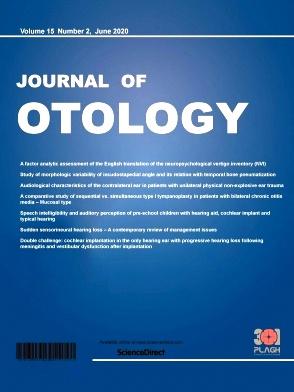Loss of Fascin2 increases susceptibility to cisplatin-induced hearing impairment and cochlear cell apoptosis in mice
IF 1.4
Q2 OTORHINOLARYNGOLOGY
引用次数: 0
Abstract
Objectives
Deletion of Fscn2 gene in mice has been linked to progressive hearing loss and degeneration of cochlear cells. Cisplatin, an antitumor drug, can cause various side effects, including ototoxicity. The aim of this study was to investigate the effects of Fscn2 on cisplatin-induced hearing impairment in mice and to explore the possible mechanism.
Methods
Two-week-old Fscn2+/+ mice and Fscn2−/− mice were treated with two doses of cisplatin, with a 3-day recovery period in between. ABR (auditory evoked brain stem response) thresholds were measured and cochlear pathology was observed at 3 weeks of age.
Results
Both Fscn2+/+ and Fscn2−/− mice showed hearing loss under the effect of cisplatin, but the impairment was more severe in Fscn2−/− mice. Further experiments showed that the percentages of outer hair cell (OHC) and spiral ganglion neuron (SGN) loss were significantly higher in cisplatin-treated Fscn2−/− mice compared to Fscn2+/+ mice. Additionally, knockdown of Fscn2 in HEI-OC1 cells worsened cisplatin-induced cell apoptosis.
Conclusion
FSCN2 mediates reduction of CDDP induced ototoxicity by inhibiting cell apoptosis.
丢失Fascin2增加小鼠对顺铂诱导的听力损伤和耳蜗细胞凋亡的易感性。
目的:小鼠Fscn2基因缺失与进行性听力丧失和耳蜗细胞变性有关。顺铂是一种抗肿瘤药物,可引起各种副作用,包括耳毒性。本研究旨在探讨Fscn2对小鼠顺铂性听力损伤的影响,并探讨其可能的机制。方法:两周龄Fscn2 +/+小鼠和Fscn2 -/-小鼠分别给予两剂量顺铂治疗,两剂量间的恢复期为3天。测定3周龄大鼠听觉诱发脑干反应阈值,观察耳蜗病理变化。结果:顺铂作用下,Fscn2 +/+和Fscn2 -/-小鼠均出现听力损失,但Fscn2 -/-小鼠的听力损害更为严重。进一步的实验表明,与Fscn2 +/+小鼠相比,顺铂治疗的Fscn2 -/-小鼠外毛细胞(OHC)和螺旋神经节神经元(SGN)的损失百分比明显更高。此外,HEI-OC1细胞中Fscn2的下调加重了顺铂诱导的细胞凋亡。结论:FSCN2通过抑制细胞凋亡介导CDDP所致耳毒性的降低。
本文章由计算机程序翻译,如有差异,请以英文原文为准。
求助全文
约1分钟内获得全文
求助全文
来源期刊

Journal of Otology
Medicine-Otorhinolaryngology
CiteScore
2.70
自引率
0.00%
发文量
461
审稿时长
18 days
期刊介绍:
Journal of Otology is an open access, peer-reviewed journal that publishes research findings from disciplines related to both clinical and basic science aspects of auditory and vestibular system and diseases of the ear. This journal welcomes submissions describing original experimental research that may improve our understanding of the mechanisms underlying problems of basic or clinical significance and treatment of patients with disorders of the auditory and vestibular systems. In addition to original papers the journal also offers invited review articles on current topics written by leading experts in the field. The journal is of primary importance for all scientists and practitioners interested in audiology, otology and neurotology, auditory neurosciences and related disciplines. Journal of Otology welcomes contributions from scholars in all countries and regions across the world.
 求助内容:
求助内容: 应助结果提醒方式:
应助结果提醒方式:


